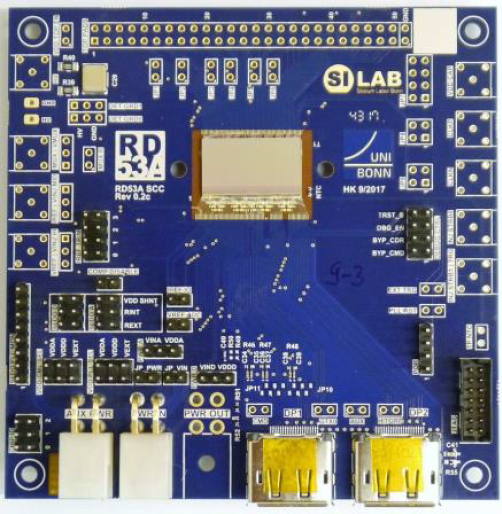
Industrial applications of AIDA-2020 results
Catarina Serafim, Daniela Antonio (CERN), 28/04/2020

Photograph of a test board with the RD53A chip. (Image: WP4).
AIDA-2020 is co-funded by the European Commission under Horizon 2020, a Research and Innovation programme aiming at fostering competitiveness and growth, and increasing benefits to the European economy and citizens. It is essential that the public investment in these activities be converted into socio-economic benefits also beyond boosting the European leadership in key fundamental research areas such as particle physics, and thus the importance of clearly identifying how research results will be implemented and how they will affect the market, future developments and policy-making.
Many companies from different countries have participated in different AIDA-2020 projects. The project consortium has actively reached out to industry, not only for services or manufacturing, but also to find innovative solutions to common challenges. The reports of the participating industrial partners refer to the benefit of accessing the community’s know-how and latest developments, as well as the opportunity to create lasting partnerships with the organisations within the project.
These are only some of the developments achieved through collaborative problem-solving.
MicroFab solutions, a spin-off of the Fondazione Bruno Kessler, collaborated with AIDA-2020 towards the improvement of their research and bespoke development and implementation of Wafer Level Packaging, a process has been developed to improve the integration with sensors and readout chips. The collaboration permitted the optimisation of the process parameters to make it compatible with industrial production.
Also in the microelectronics field, the development of a new 65-nm CMOS (Complementary Metal-Oxide Semiconductor) chip led to a partnership between AIDA-2020 and a French start-up called WEEROC. Not only WEEROC’s contribution to this project was very important to increase their own expertise in the field, but it also led to a proposal successfully approved for ATTRACT funding. Christophe de La Taille, co-founder of the start-up and work package leader in AIDA-2020, said, “It was not something we planned for in the beginning, but this result was in part due to the developments we made in the context of AIDA-2020”.
For innovative gas detectors, the collaboration with industry was also essential. ELTOS, an Italian Company with background in printed circuit boards, actively collaborated with the researchers in Micro-Pattern Gas Detectors. A parallel activity of Technology Transfer of the manufacturing process for the single-resistive layer layout was carried out at ELTOS, where almost every manufacturing step of the detector was performed, opening the door towards a unique example of mass production of MPGDs.
One final example is ARKU Maschinenbau GmbH, a German company specialised in roller levelling, who worked closely in the mechanical absorber structures for calorimeters. The challenges presented to the company allowed them to reach farther into the solutions and increase their level of expertise.
“The advantages of working with industry are two-fold,” says Aurelie Pezous, a Knowledge Transfer Officer at CERN and work package leader for AIDA-2020. “Not only are these collaborations a way of finding better technological solutions for research laboratories, but they also benefit the industry partners in accelerating the development of their R&D processes, and promoting research-based innovation.”
